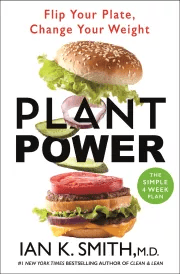For dieters who want to utilize the benefits of fruits, vegetables, and complex carbs—without eliminating the meat, dairy, fish, and fats they love—Dr. Ian K. Smith’s new book Plant Power delivers the most flavorful and favorable plant-based foods to their plates. In a detailed but easy-to-implement four-week program, readers will, day-by-day, flip their diet from 70% meat / 30% plants to 30% meat / 70% plants, leading to natural and pain-free weight loss, keeping them feeling full and satisfied.
Dr. Smith joined QDT for a chat about the research behind Plant Power and the ins-and-outs of a plant-based diet.
- What was your motivation behind beginning your research into the power of plants and plant-based diets? Do you follow this diet yourself?
I had been thinking for some time that while I love meat, I have been eating too much of it. I had been reducing my red meat intake in an informal way, but I wanted to get serious about it. I didn’t want to give up all of my meat and seafood, but I did want to be more cognizant of the quantities I consumed. I had obviously been well versed in the enormous amount of health benefits from plants, but I really hadn’t made a significant adjustment to match that knowledge. So I decided to formalize my transition from a heavily meat or animal based diet to one that was more plant based. I didn’t want to become a vegan or vegetarian, but I wanted the benefits of eating that way sometimes and the option to eat meat and seafood when I felt the urge. So over a 4-week period I gradually shifted my diet to being more plant based, and it went well and has become my new way of eating.
- Are there any proteins that are only found in animals and fish that are important for humans to digest? I'm thinking of B12, which is easily accessible in supplement form for those that choose not to eat meat. Are there any other examples of that type of protein, and what are the alternatives?
There has been a raging debate for years about which is better, plant protein or animal protein. For my money, the two are basically interchangeable except for the issue when you talk about complete protein (having all of the essential amino acids in the protein). Many plants don’t have complete protein, but this won’t have an realistic impact on the average person. Bodybuilders and heavy weightlifters might be able to construct and argument as to why they need the complete protein from animal products, but note there are some plants that actually have complete protein also.
- What do you think is the most surprising benefit of following a plant-based diet?
The increase in energy levels is amazing. I have always been an energetic person, but I found that not only were my energy levels higher, but my sleep was much better, and I felt so rested when I woke in the morning.
How to Get More Vegetables into Your Diet
- What is your favorite plant-based recipe?
In Plant Power I have a recipe for a Spicy Thai Veggie Stir Fry. It’s so easy and good and filling. Meat lovers as well as vegetarians/vegans will equally enjoy this dish.
- How do you recommend those who decide to follow a plant-based diet communicate with those who might strongly disagree with this choice?
People should be clear on terminology to help others truly understand what they’re doing. I use plant based to mean that most of your foods are plant-based but not all. Plant-based doesn’t mean you have to be a vegetarian or vegan, rather it means you have a greater percentage of plant-based foods in your diet. People should communicate this clearly, and I think once they do, the vast majority of people who understand this concept would agree that it’s healthier and desirable.
Find out more about Dr. Smith on his website.
- What are your top tips for shifting into a plant-based diet mindset without quitting meat cold turkey?
That’s why I wrote Plant Power. The shift is gradual and simple and it doesn’t put you in a state of meat/seafood withdrawal, because you are still having these foods just in diminishing amounts. Start with having at least one salad a day for one of your meals, then choose a day like Monday when you decide to go completely meatless. Commit to at least 2 of your dinners in a week being well-spiced and cooked veggies over a bed of rice. Small changes like these are not only easy to implement, but they are sustainable ,and you still have plenty of opportunities to eat animal-based products should the need or urge arise.
Check out the Nutrition Diva for more healthy eating tips.

